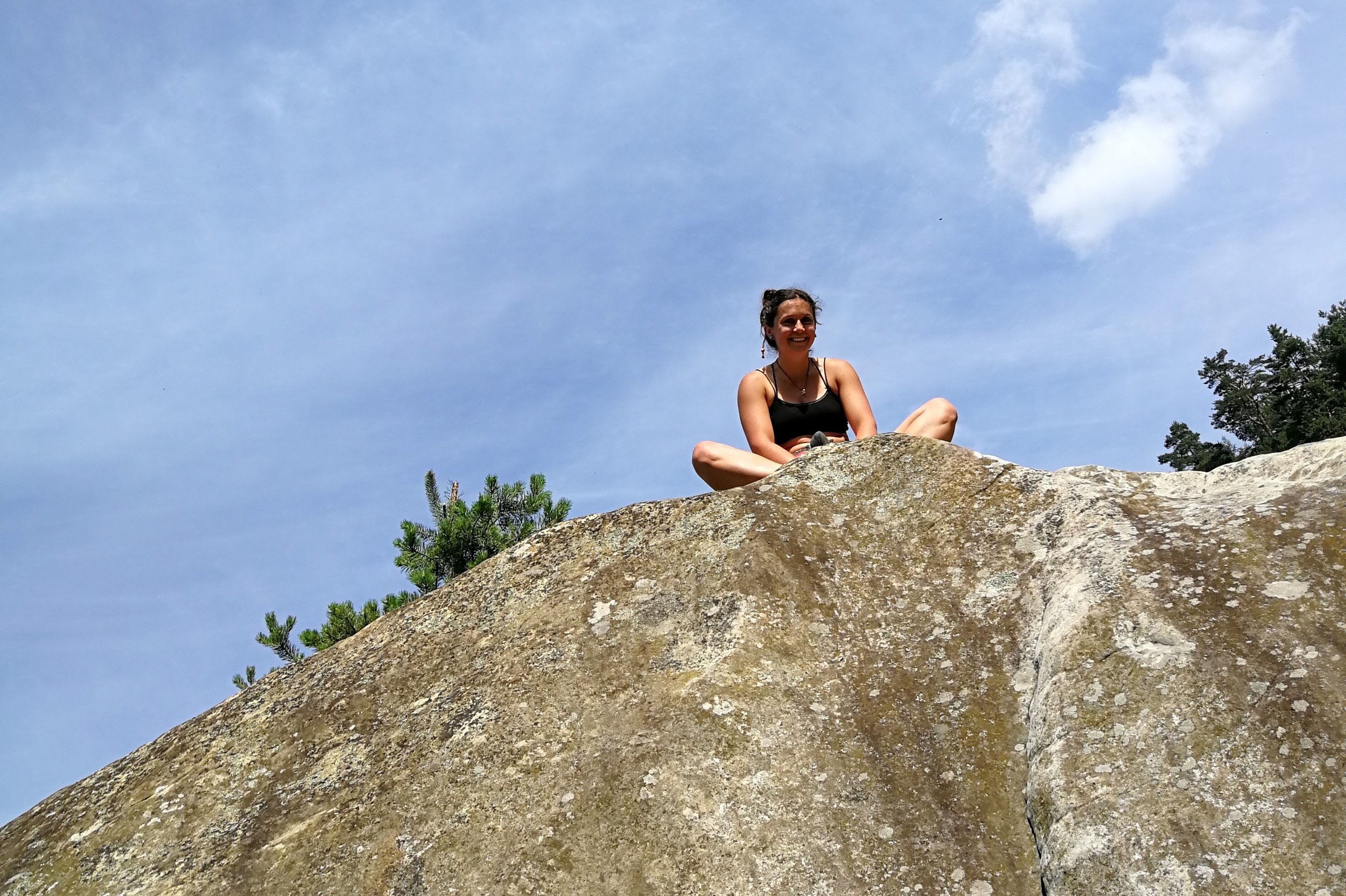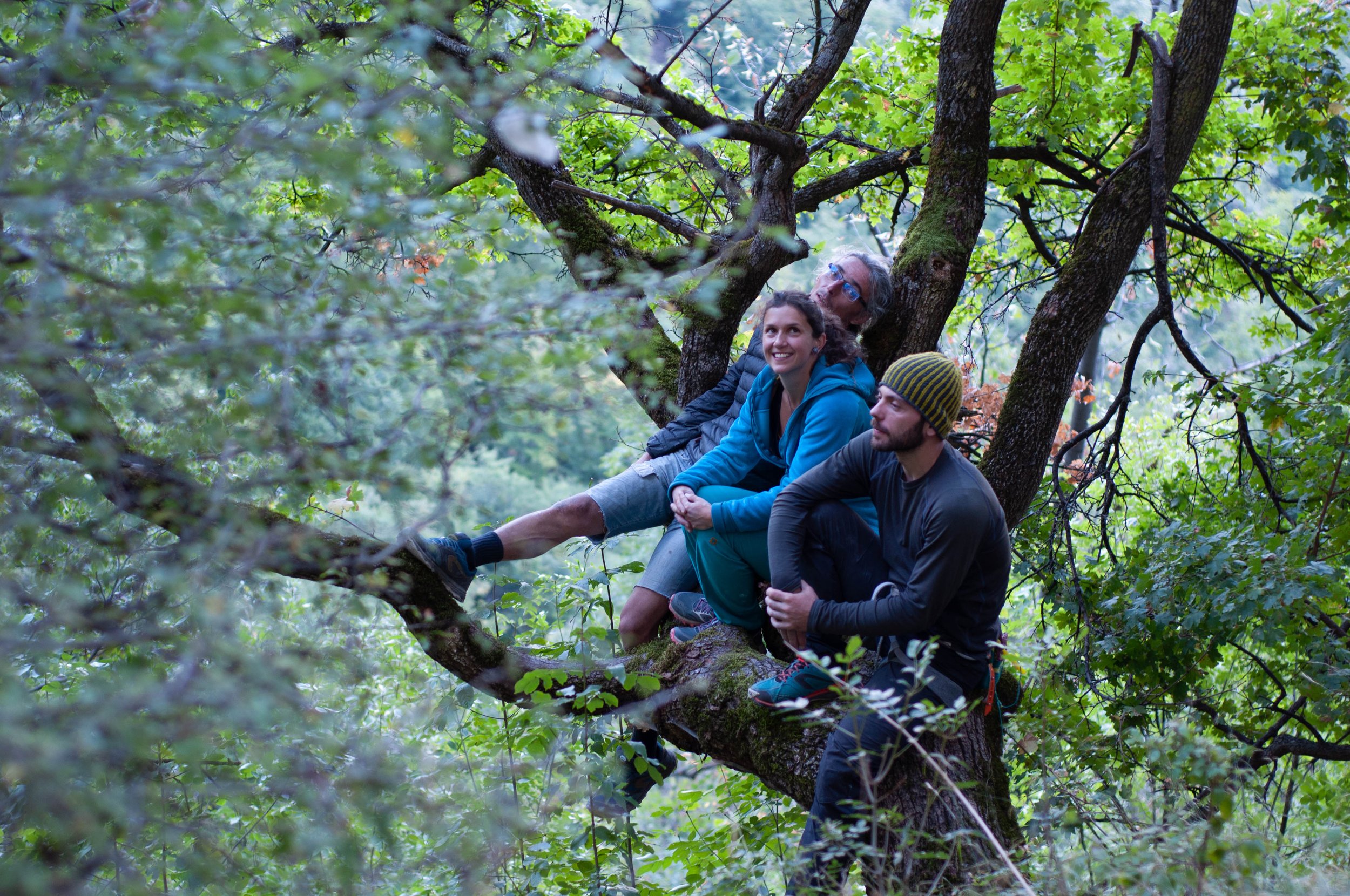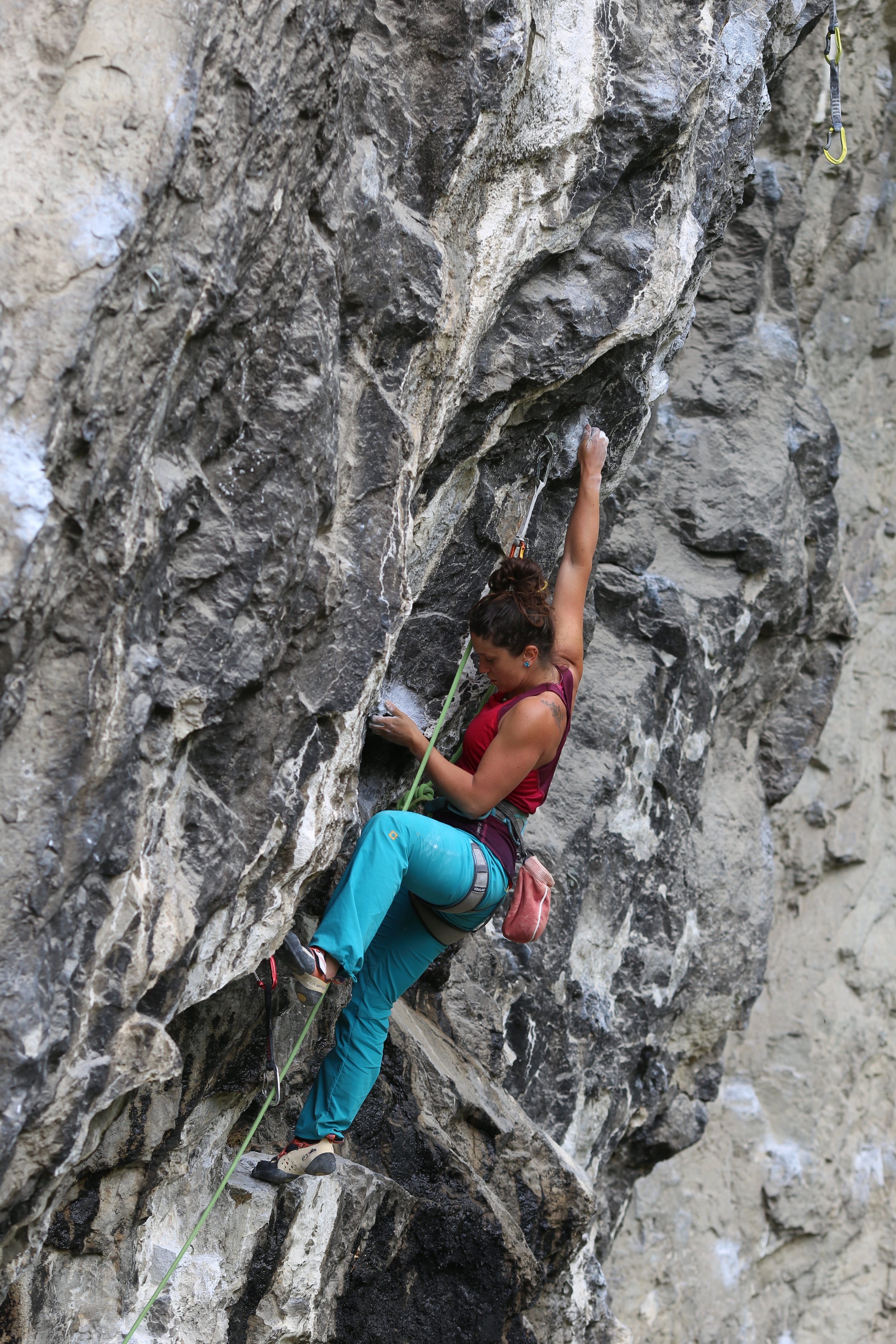Voices of Adventure: Rock Climbing with Octavia Drughi - Part One
I met Octavia earlier this year over the internet. I was fascinated by her lifestyle I read about on her blog and wanted to learn more about her and the life she has created for herself. She is a really friendly and open person and our first conversation felt like we’ve known each other for a long time. She invited me for my first rock climbing experience and we’ve been in touch ever since. She was the perfect candidate to be my next Voice of Adventure and she was delighted to answer the questions I sent over to her about her story. So without much further ado, let Octavia tell you about her fascinating life and her story with rock climbing in the first part of the interview.
Image credit: Octavia Drughi
Could you share your journey into rock climbing? How did you first become interested in the sport?
“It was all thanks to my parents. They took me on hikes in the Carpathian Mountains when I was old enough to walk. They inspired a love for nature that only kept on growing.
When I was around 12, I saw my dad climb outdoors for the first time. I was captivated and asked if he would take me climbing, too. He promised one day he would and I made him keep his promise. So, I started climbing with my dad when I was around 14.
Shortly after, I began going to a local climbing gym where I met other climbers. I had the opportunity to go climbing outdoors with new people. I was so lucky that my parents allowed that, even though I was only a teen in high school.
Then, I met my future husband and we’ve been climbing partners ever since. We’ve grown together and never stopped pushing each other.”
Are there any particular individuals or experiences that have significantly influenced your climbing career?
“I have to mention my dad here. After all, it was seeing him climb that made me realize I want to try this. Then there was my husband. He’d been climbing for a while when I met him. I was not good at climbing at all when I first started out, I was struggling a lot and was very scared, even though deep down I really liked it. I didn’t give up and my husband didn’t give up on me either. He’s been by my side 110%, and his continuous support is what helped me grow as a climber (and a person). So yeah, he’s been the greatest influence. "
What challenges have you faced as a female rock climber, and how did you overcome them?
“Luckily, I’ve found a tribe where gender didn’t matter. We all respect each other.
So, the only challenge I can think of is that I’m a short climber and it took me a while to accept that I often need to push way harder because of that. This does pay off every now and then because that struggle only makes me stronger.
Also, being a woman means that my energy levels and focus can fluctuate throughout the month. But I’ve learned to work with that and take it easy. Sometimes, I’m even able to turn this to my advantage (I know when my peaks and my lows are, but I don’t take them for granted).”
Can you describe what a typical day in the life of a rock climber looks like for you?
“My climbing days are quite mellow. Sometimes I have a clear plan for what I’d like to try to climb that day, sometimes I don’t. There are days when we decide on the destination just before heading out. I’ve often found that the days that aren’t planned to the last detail turn out way better.
A climbing day usually begins with packing all the gear, going to the crag, getting everything out of the backpack and throwing all our stuff around so that it looks like we’ve been there for days. The climbing session begins with coffee, freshly brewed in a small moka pot over the camping stove. Then, I start to warm up with an elastic band and I climb an easy route. I catch up with friends (if there are any), have a laugh, relax, enjoy the day.
After the warm-up and after getting into the vibe of the place and day, the “battle” begins. That is, I start to climb on whatever challenges I’ve set for myself, whether it’s a project I’m working on or just a training day (climbing as many routes as possible). There are loads of breaks in between and I try to spend as much time as possible at the crag. Even after I’m no longer able to climb, I’d still belay and hang out with friends.”
Image credit: Octavia Drughi
How has rock climbing influenced your daily routines and lifestyle?
“It has definitely made me more patient, more accepting, more focused… Simply put, it has made me mentally stronger. For me, climbing is a process. It’s hard man, no matter the grade. And the more present you are, the better it goes. It keeps teaching me a lot about myself and I try to apply these lessons in my personal life.
In terms of daily routines, I would say that I have similar routines when I climb as well as when I don’t. I’ve definitely gotten used to being active and being out in nature, so I need to get my fix.
As for my lifestyle, I have to admit that I make decisions based on climbing trips or how many days I’d like to climb and where. Sometimes, that means turning down work. As a result, there are times when money is short because I choose to climb more and work less.”
How do you maintain your fitness and focus for climbing? Do you train outside of climbing and do you follow any specific dietary practices?
“I have found that, for me at least, the best way to get better at climbing is to climb more. So, as long as the weather allows, I prefer to go outside and climb instead of training indoors. Luckily, I live in the mountains so I can go climbing whenever the weather allows, even in the evenings.
When the weather doesn’t allow (low temps, long periods of rain) or when I’m working and am too far from outdoor climbing, I go to the climbing gym or do some workouts at home on my hangboard (weighted hangs, pull-ups, abs, etc.).
I don’t have a fixed training regimen. I mostly listen to my body and I try to stay fit. When I have long periods of climbing outdoors, I don’t feel like training on top of that. When I don’t climb as much, I feel the need to add some home workouts, too.
Throughout the climbing season (and the year), I do yoga. It really helps balance my body. There’s a lot of stress on the muscles and joints, and yoga helps relieve a lot of that tension and stiffness. For focus, I’ve discovered that breath work helps me stay more present and push my limits further.
In terms of diet, I mostly just listen to my body. I indulge myself, but try not to go too far. I eat many small meals during the day (I need to keep my blood sugar in check or I’m not that pleasant to be around). When I’m more active, I eat more. When I’m not as active, I don’t feel the need to eat as much. Overall, I try to find a balance between my cravings and what I know my body needs to recover and work well.”
Image credit: Octavia Drughi
How has adopting the dirtbag lifestyle shaped your perspective on what's truly important in life?
“This lifestyle, being a dirtbag, making decisions for the now, means that you can’t really think far into the future. This scares a lot of people, not knowing what you’re going to do next, how are you going to make ends meet. Experience has shown me that it all works out in the end. I’m still climbing and eating well. So, I try not to stress about the future too much and just let things happen.
So, I guess living like a dirtbag means that you don’t get to make too many plans. The one you do make are flexible. I think this all helps me be more present. When you can’t think too much about the future, you realize that all you have is the present moment and that you have to make it count.”
What are some of the most memorable or enlightening experiences you've had while embracing this lifestyle, and how have they influenced your outlook on life?
“Quitting my past job, where I’ve stayed for 5+ years, and deciding to work in rope access on a project-basis (making enough money to climb and get by), has been a turning point in my life. My mind was rested, even though my body was aching while I worked. I realized that working just as much as I see fit, without feeling stuck, was what I needed to do.
Then, of course, there have been the many memorable climbing trips where I’d enter a completely different rhythm of life, out in nature, outside the confines of society, embracing a simple way of living where it was all about being there and then. It was sometimes cold, sometimes wet, sometimes tiring, but man I’d do it over and over again. And I will.”
Image credit: Octavia Drughi
Image credit: Octavia Drughi
What's your training regimen like when preparing for a climbing trip or competition?
“It all depends on the circumstances. If I’m able to climb outdoors, I would just climb as much as possible, focusing on strength, volume, and endurance (trying hard routes that I may not ever send, climb many routes I can send quickly, climb a more challenging route in a day as many times as possible).
If I’m not able to climb outside, then I’d train indoors – at the gym focusing on the same key elements (strength and endurance) and at my hangboard (weighted hangs and pull-ups). I don’t participate in competitions; I’ve found that they don’t quite resonate with me.”
How do you prepare yourself mentally for tough climbs?
“Well, the mental aspect of climbing is the hardest to tackle. Even when you’re physically fit, the mind can set you back. Being aware of that is the first step (and perhaps the most important). Breathwork is something that helps me. And I can apply it before and during a climb to help me be more present.
I guess any technique/trick that can help quiet the mind, stop that chatter that can pull you back and sabotage you, is welcomed. I know that chatter drains a whole lot of energy, so I try not to go too much into the details. Yes, I have the beta for the climb before my eyes, but, as much as possible, I don’t think about the outcome, whether positive or negative. I try to just be. On the rare occasions when I do nail that, it’s a blissful trance-like state.
But I must admit that I’m still working on the fine details. It’s a process.”
Image credit: Octavia Drughi
Are there any climbing-specific techniques or strategies you've found particularly effective?
“In terms of technique, I’d say that what works for me is climbing rather slow, focused, with controlled movements, while taking time to rest wherever and whenever I can find a good enough position to avoid/delay the pump as much as possible.
In terms of strategies, I’ve found that being relaxed and having a positive attitude works best for me. The more I smile, laugh, and joke around, the more loosened up I am. And the more loosened up I am, the more my body and mind work at full capacity.
I climb my best when I don’t put pressure on myself, while at the same time, I am psyched and determined to execute. It’s a very fine line, and I’m not always able to play it right. But hey, I’m learning.”
Stay tuned to learn more about Octavia in next week’s continuation of the interview! And if you have any questions for her about the lifestyle, check out her blog or leave a comment.







